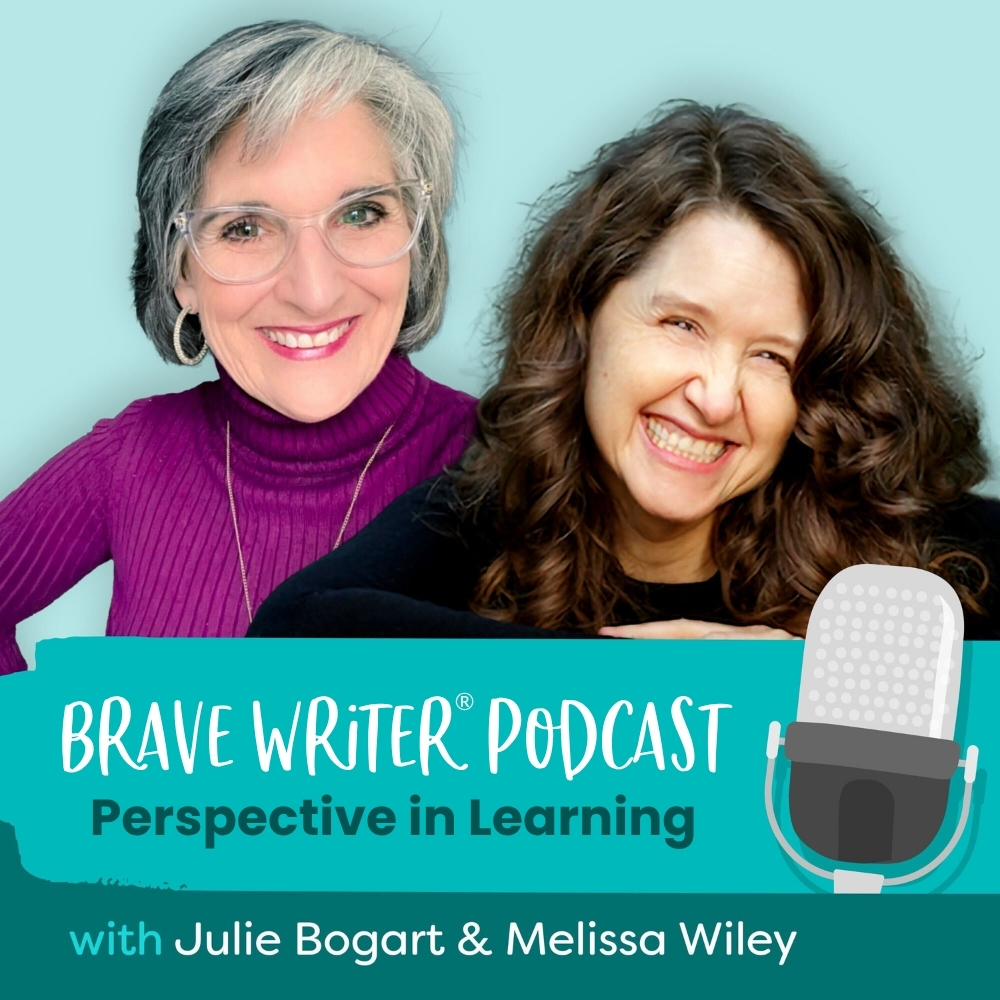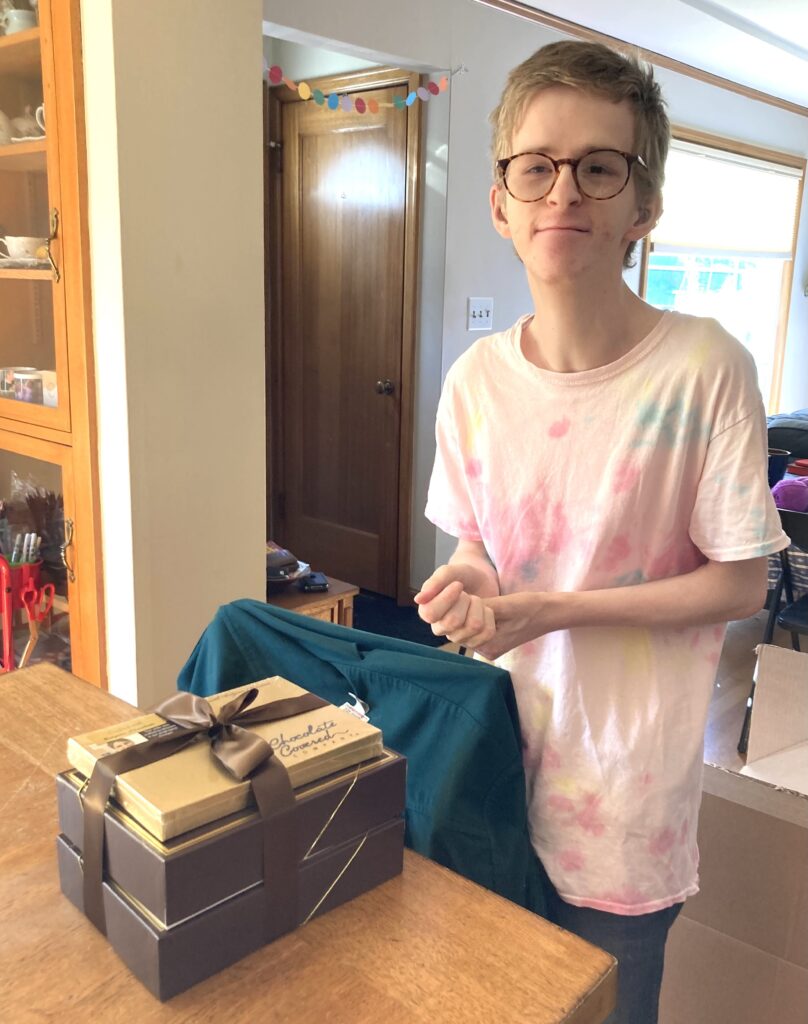[Podcast #313] Perspective in Learning

What if the key to helping your kids love learning is simply seeing the world through their eyes?
In this Brave Writer podcast episode, we explore perspective as the secret sauce of education and connection. We begin with Steven’s unforgettable appreciation letter to UPS (and the jaw-dropping chocolate response!) then move on to practical ways to help kids imagine other points of view:
- through microscopes and magnifying glasses,
- collaborative storytelling,
- fan fiction,
- and rich books that stretch their empathy.
We also talk about “wasted” time, sandbox learning, and why pleasure matters more than performance.
Tune in and choose one new perspective shift to try with your kids this week.
Show Notes
Perspective is one of the most powerful tools we have as parents and educators, and it’s astonishing how often we forget to use it. We want our kids to care about math facts, handwriting, history timelines, and essay structure, but they don’t yet share our vantage point. From where they sit, those priorities can feel arbitrary, tedious, or even hostile. When we slow down enough to see through their eyes, everything about learning begins to change.
Perspective Begins with Appreciation
One of our favorite stories about perspective started with a simple thank-you note. Steven wrote an appreciation letter to UPS after a particularly skillful delivery experience. That handwritten note climbed the corporate ladder until it reached an executive response team member who tracked the family down to send a tower of gourmet chocolates specially tailored to his love of marshmallows (see below pic!). Buried in her original email was the subject line “customer complaint response” because there wasn’t even a category for appreciation.
That tiny glimpse into the UPS system reminded us how rare genuine gratitude is. Most structures are built to handle complaints, not thanks. When our kids learn to imagine the human being behind the uniform, inbox, or name tag, they begin to see the world differently. The same is true in our homeschool. When we respond to their writing with specific, heartfelt praise—“This image is going to stay with me”—we energize them. That positive feedback doesn’t just feel good; it makes them more willing to take risks and more open to gentle critique later.
Changing the Lens—Literally and Figuratively
Perspective-taking often begins with the body. When we hand a child a magnifying glass or jeweler’s loupe, they suddenly notice details they never knew were there: sparkles in a rock, tiny veins in a leaf, the texture of paint on a canvas. A microscope, telescope, or pair of binoculars does the same thing on a different scale. Change the tool, and you change what’s visible.
We can do this with our own bodies, too. Lie on the floor and look at the room from a four-year-old’s height. Pretend to be the dog: crawl on all fours, drink from a bowl, “eat” from a plate with just your mouth. These playful exercises aren’t about perfect imitation; they’re about discovering how different the world feels from another vantage point.
Literature offers a similar invitation. When we read a book like Watership Down, Dogsbody, or the essays in Disability Visibility, we borrow other lives for a while—rabbit lives, dog lives, disabled lives. Fanfiction lets our kids practice this same skill: writing from a villain’s point of view, retelling a fairy tale from the “bad” character’s side, or exploring side characters who rarely get a voice. Over time, this habit of asking, “How does the world look from where you stand?” becomes a form of intellectual and emotional muscle memory.
Becoming Beginners Again
Perspective also means interrogating our own assumptions about learning. Traditional schooling tends to smush content (what kids should know) and skills (what they must do to access that content) into a single, non-negotiable package. Homeschoolers have the luxury of separating them. We can strew interesting books, tools, and experiences that ignite curiosity before we insist on skills like note-taking, outlining, or formal lab reports.
To really understand our children’s struggles, we have to become beginners ourselves. Try doing copywork with your non-dominant hand, learning a new musical clef, or playing with a base-12 number system. It’s humbling and illuminating to feel your brain work that hard again. Suddenly, the seven-year-old balking at handwriting doesn’t look lazy; they look exactly like you, sweating over a brand-new challenge.
When we make room for sandbox learning, such as failed cookie experiments, homemade parachutes for action figures, and invented number systems, we’re teaching something far more valuable than any single fact set. We’re showing our kids that time spent asking questions and trying things is never wasted. It’s how understanding is built. Mastery will come later; for now, we’re cultivating pleasure, curiosity, and the confidence to keep experimenting.
Perspective, in the end, is a practice. It’s choosing to ask, “What does this feel like from your side?” whether we’re talking to a child, a customer-service rep, or a fictional rabbit. When we approach learning from that angle, our homeschools become less about forcing outcomes and more about walking alongside real human beings as they discover the world.
Resources
- Discover the adventure of self-directed learning with Unschool Adventures! And hear more from founder Blake Boles on the Brave Writer podcast
- Visit our “Tools for the Art of Writing” page in the Brave Writer Book Shop
- Here are Julie’s beloved math manipulatives and Dogsbody, Melissa’s favorite Diana Wynne Jones book
- Fall class registration is open!
- Visit Julie’s Substack to find her special podcast for kids (and a lot more!)
- Purchase Julie’s new book, Help! My Kid Hates Writing
- Brave Learner Home: bravewriter.com/brave-learner-home
- Learn more about the Brave Writer Literature & Mechanics programs
- Start a free trial of CTCmath.com to try the math program that’s sure to grab and keep your child’s attention
- Subscribe to Julie’s Substack newsletters, Brave Learning with Julie Bogart and Julie Off Topic, and Melissa’s Catalog of Enthusiasms
- Sign up for our Text Message Pod Ring to get podcast updates and more!
- Send us podcast topic ideas by texting us: +1 (833) 947-3684
Connect with Julie
- Instagram: @juliebravewriter
- Threads: @juliebravewriter
- Bluesky: @bravewriter.com
- Facebook: facebook.com/bravewriter
Connect with Melissa
- Bluesky: @melissawiley.bsky.social
- Website: melissawiley.com
- Substack: melissawiley.substack.com
- Instagram: @melissawileybooks
Produced by NOVA



















